By Ahmed Al-Rawi, for The Conversation
In order to curb the spread of disinformation by official Russian news sources, the Canadian Radio-television and Telecommunications Commission (CRTC) recently made a symbolic move by banning Russia’s state-run RT news channel in Canada.
Yet this is an ineffective measure given the way social media channels controlled by the Russian Embassy in Ottawa are spreading disinformation, and how fact-checking is being weaponized by the Russian government to twist reality and confuse people about the war in Ukraine.
As a researcher who studies disinformation, I first investigated the way Arabic tweets with hashtags like #WeStandWithRussia and #RussiaHasAJustCause have been used since the beginning of this year.
New accounts
In my ongoing research, I’ve collected 26,440 tweets posted by 10,544 unique users who supported Russia. Over 27 per cent of the tweets were posted from accounts created in 2022, including 4,052 tweets in just one day on Feb. 15, 2022, and 5,457 tweets in the month of February alone. The highest number of tweets were posted in January and February 2022 by accounts created in these two months.
When I further examined the most-mentioned Twitter accounts that these users retweeted, I found they were the accounts of the Russian Embassy in Egypt (@Rusembegypt) followed by the Arabic-language Russian Ministry of Foreign Affairs (@Russia_AR). The majority of the other accounts frequently retweeted are related to other Russian embassies in the region.
These findings made me turn my attention to Canada.
The Russian Embassy in Ottawa runs its own Twitter account — @RussianEmbassyC — as well as a Telegram account and VK (Russia’s Facebook) public channels.
Similar to the findings in the Middle East, I have found that the Russian Embassy in Canada is active in spreading disinformation and promoting the Russian perspective on the events taking place in Ukraine.
‘Fake news’ accusations
Instead of heavily relying on RT or Sputnik, Canada’s Russian Embassy mostly retweets messages from the Russian Ministry of Foreign Affairs and other Russian embassies from around the world. That includes tweets that attempt to discredit any factual reporting on the war.
The Russian embassy also frequently posts official statements attacking Canadian politicians as well as Canadian media for what it views as their biased positions about the war in Ukraine. That included an attack on the Canadian government and the news media for allegedly spreading lies.
The term fake news itself is weaponized to serve the interests of the Russian government, similar to the way Donald Trump frequently used the term fake news when he was president of the United States.
One of the most troubling features of this Russian disinformation campaign pertains to the weaponization of fact-checking practices. In a recent tweet, the embassy announced the launch of a new website called waronfakes.com, which attempts to lend credibility to official Russian propaganda.
The website allegedly provides fact-checking services on the war in Ukraine and is offered in five languages (English, French, Spanish, Arabic and Chinese). Ironically, no Ukrainian or Russian-language content is offered, revealing what foreign audiences are being targeted by the Russian government. Nonetheless Russian content is offered on a Telegram channel.
Sudden flurry of new accounts
To understand who’s retweeting the Russian Embassy’s messages, I collected 4,796 tweets from 2022 posted by 3,796 unique users. Similar to the case of the Middle East, the month of February 2022 had the highest number of Twitter accounts created that subsequently retweeted posts from the Russian Embassy.
While this might not prove any co-ordinated inauthentic activity, it does look suspicious.
The Russian Embassy in Canada mostly retweets messages sent by the Russian Foreign Ministry, like @mfa_russia and @mid_rf, and vice versa. The @mfa_russia account is the second-most active in terms of retweeting messages sent by the Russian Embassy.
Though the official and public efforts in Canada in terms of cracking down on Russian disinformation has been to ban the RT and Sputnik news channels, the reality is that Russian embassies are creating their own information echo chambers.
Social media also creates direct engagement with the Canadian public that cannot be blocked by CRTC. The embassy often sends direct messages like the one below via its Telegram channel:
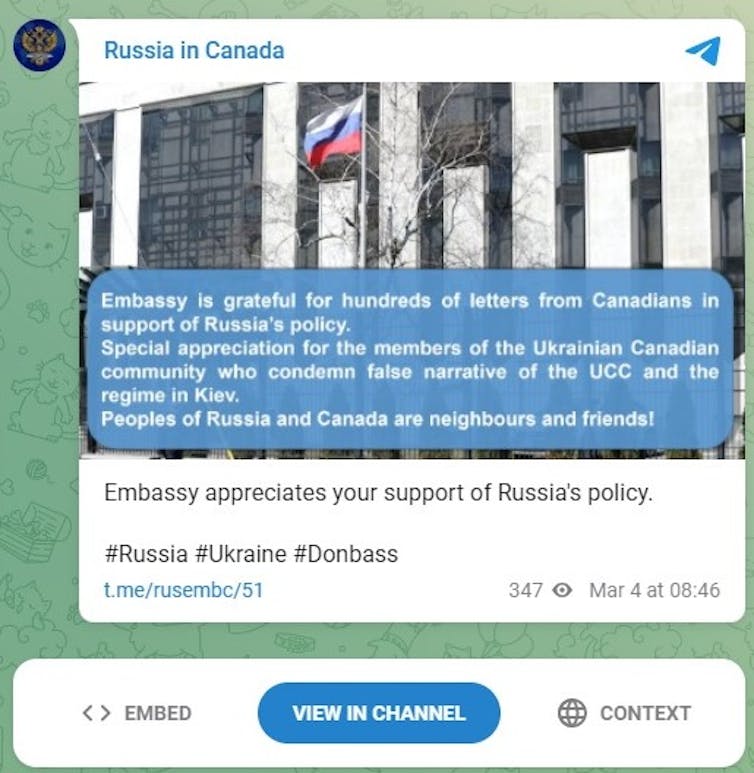
Other times, the embassy urges the Canadian public to mistrust news coverage of the events in Ukraine.
My analysis shows the CRTC’s decision to ban RT is ineffective because the news channel can be viewed on multiple platforms in Canada and elsewhere.
Russian disinformation has evolved to increasingly rely on various information sources, including the social media outlets of diplomatic missions around the world as well as fake fact-checking sites like waronfakes.com.
The disinformation war that Russia is fighting is being fought on different linguistic fronts — the English language is only one of them — and it’s mostly being waged on social media.
By Ahmed Al-Rawi, for The Conversation
Ahmed Al-Rawi is Assistant Professor, News, Social Media, and Public Communication, Simon Fraser University.
This is a corrected version of a story originally published on April 10, 2022. Figures have been updated in relation to the Arabic tweets and Russian embassy tweets.
‘From Canada with love’: Canadians are paying to write messages on Ukrainian rockets
“Love from Toronto.”

“Putin … with loathing from Canada.”
“Liam from Canada says F—k you Putin.”
The rockets Ukrainian forces have been firing at the Russian army in recent weeks have carried taunting messages from Canadians.
Photos taken by Ukrainian troops show inscriptions requested by Canadians on artillery, mortar and howitzer shells.
They are part of a fundraising campaign that allows donors to brand Ukrainian rockets launched into Russian-held territory.
In exchange for a pledge, Ukrainian troops will pen a donor’s words on a shell and shoot it at Russian positions.
Afterwards, the sponsor gets a photo of the shell and video of it firing. The donations are used to buy equipment for the Armed Forces of Ukraine.
“Soldiers at the front lines will write your message in permanent marker on an artillery shell,” the fundraising website says. “Wish someone a happy birthday. Ask for a date … Send greetings to Putin.”
Depending on the type of munitions, minimum pledges range from $150 to $2,000. According to the website, the process takes two weeks.
“It felt like a small revenge,” said Nika, a Ukrainian-Canadian from Manitoba who participated. Global News is identifying her by her first name only due to security concerns.
She said her 86-year-old grandfather still lives in Ukraine and has to hide in a bomb shelter due to Russian attacks. “We feel helpless watching this horrific war unfold,” she said.
The message she put on the rocket read: “Glory to Ukraine. Canada is with you.”
Writing messages on weapons is a longstanding tradition, but as a fundraising tool in a conventional armed conflict, it may be unprecedented.
“This is probably new,” said Jessica Davis, a former Canadian Security Intelligence Service analyst specializing in finance.
An expert on national security law, Prof. Leah West of Carleton University, said she did not see any legal problems for Canadians who take part in the campaign.
Ukrainians have launched scores of innovative fundraising drives to finance their defences against the invasion ordered by President Vladimir Putin six months ago.
Anton Sokolenko said he started Sign My Rocket on Telegram because so many supporters of Ukraine wanted to pay to write on ammunition.
A 21-year-old IT student and volunteer at a Ukrainian non-profit group that supports the armed forces, Sokolenko said two web designers later created the website.
“And the site is very important, so people around the world can express their hatred to Russians, make a donation to the Ukrainian army and get something in exchange,” he said in an interview.
Donors can also write messages on the turret of a T-72 tank or the barrel of a howitzer, as well as on a grenade dropped from a drone.
So far, the campaign has raised more than US$200,000. The money has been used to purchase vehicles, drones and other gear, Sokolenko said.
He shared photos showing a half-dozen rockets with messages he said Canadians paid to have written onto the shell casings.
All have been fired already, although he didn’t know exactly where.
“With love from Canada,” read one of them, paid for by Rob, an Alberta resident who Global News is identifying only by his first name for security reasons.
In an interview, he said many of his friends were Ukrainian-Canadians, and while he had donated to humanitarian groups, he also wanted to help the troops.
“I just wanted to do something,” he said. “It’s not a lot, but I’m willing to have my little part in it.”
He said he had also paid to put a message on an M777 howitzer shell: “F—k Putin – Ukraine will always be free!!”
The Canadian government sent several howitzers to Ukraine in April, provided training on their use and later sent replacement barrels.
A B.C. resident, who Global News is identifying only by his first name Ethan, said he had put a message on a shell as a birthday gift for a Ukrainian friend.
“My motivation for purchasing a shell message was that I wanted my money to go directly to a Ukrainian on the frontlines, instead of some faceless charity,” he said.
“I strongly support Ukraine, and I hope our government continues to send support to them.”
Stewart.Bell@globalnews.ca
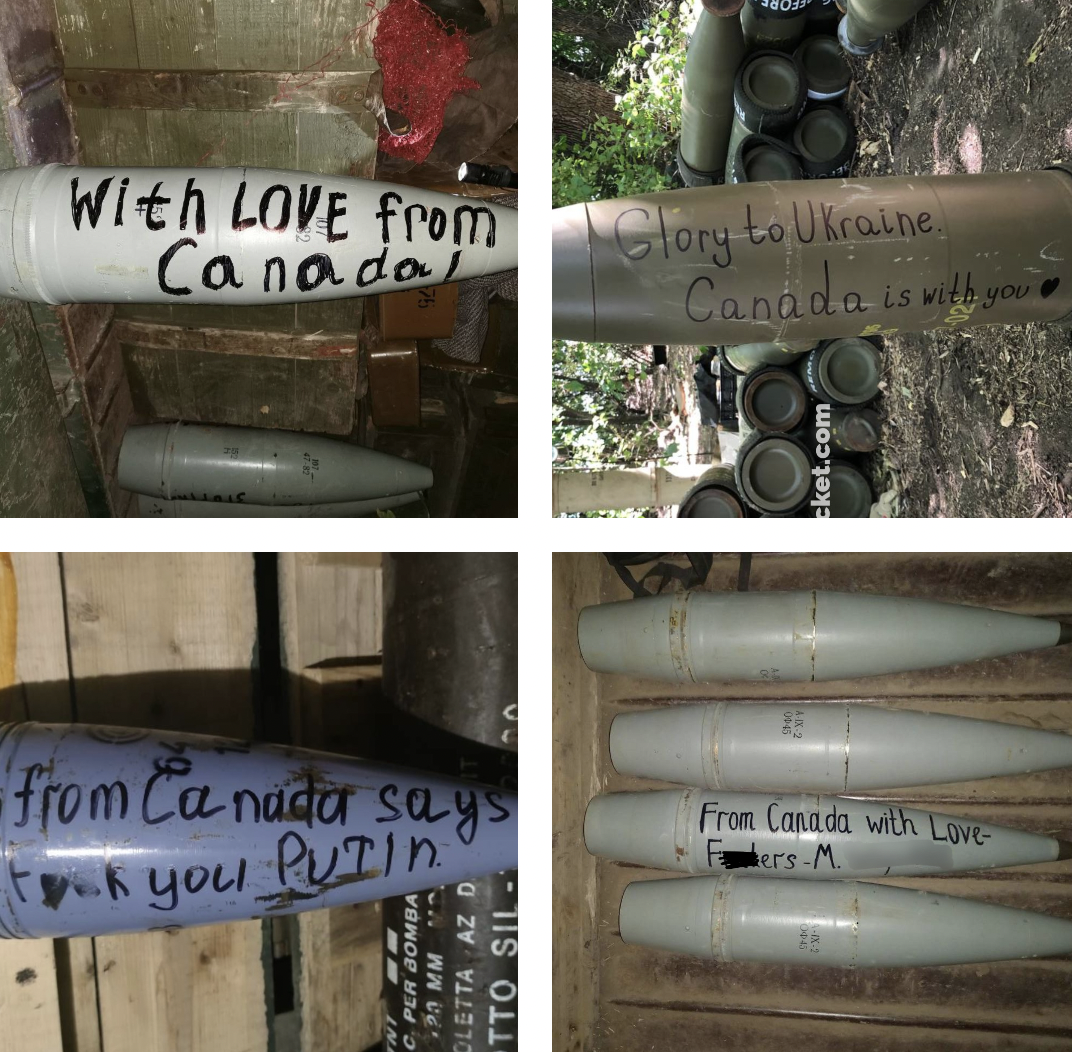
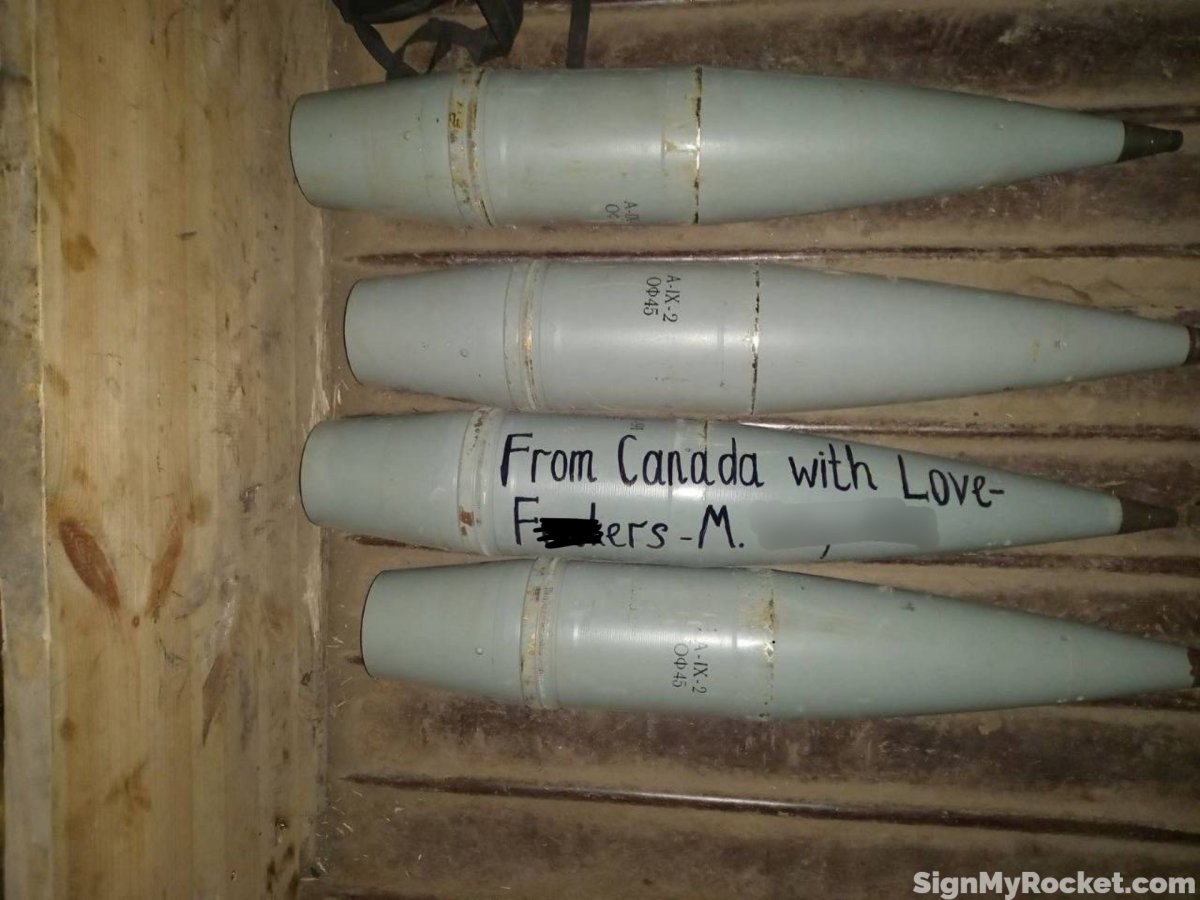


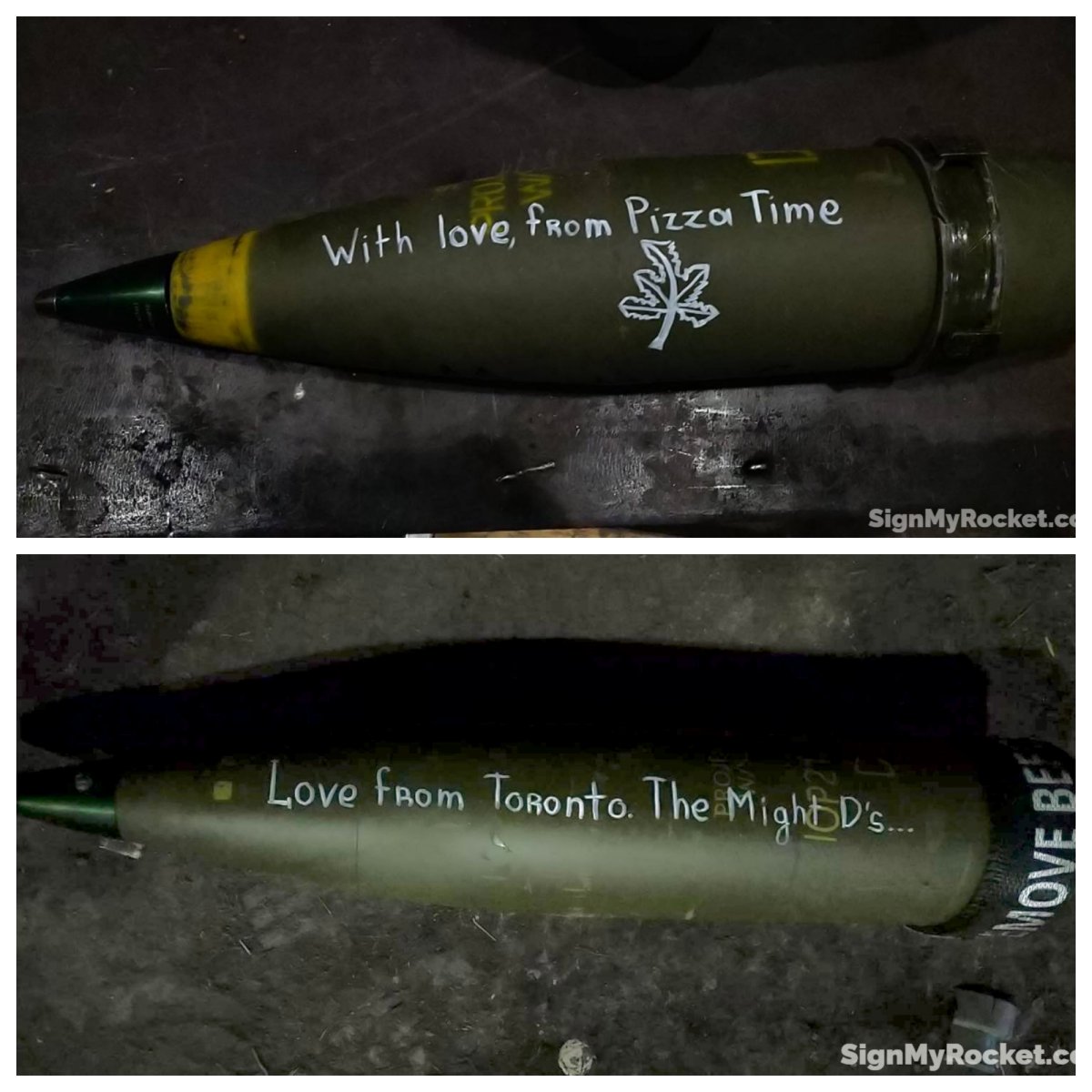

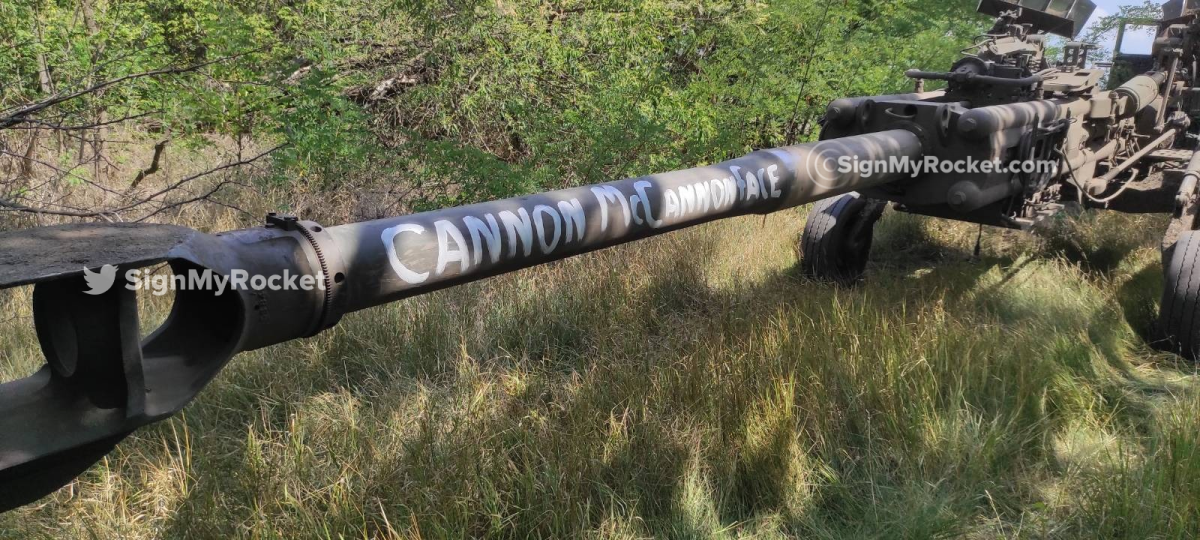
No comments:
Post a Comment